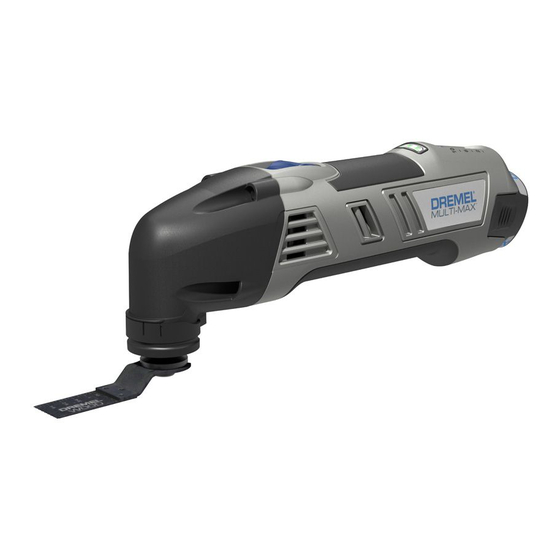Dremel 8300 원본 사용 설명서 - 페이지 13
{카테고리_이름} Dremel 8300에 대한 원본 사용 설명서을 온라인으로 검색하거나 PDF를 다운로드하세요. Dremel 8300 15 페이지.

When the battery is dead, the tool will automatically turn off.
This will be a sudden stop as opposed to a gradual winding
down of the tool. Simply recharge the battery and reuse.
3 l ights – 100% charge remaining
2 l ights – 50% charge remaining
1 l ight – 25% charge remaining
1 " flashing" light - tool is about to shut off
3 " side to side" lights – battery charge is too low to run tool.
Recharge the battery.
3 " flashing" lights – battery is too hot for use.
Turn tool off and let battery cool down before resuming use.
Inserting and releasing battery pack
Release battery pack from tool by pressing on both sides of the
battery release tabs and pull away from housing (Picture 8).
To insert battery, align battery and slide battery pack into tool
until it locks into position. Do not force.
PICTURE 8
A . Housing
B . Battery pack
C . Battery release tabs
Important charging notes
1 . The charger was designed to fast charge the battery only
when the battery temperature is between 32°F (0°C) and
113°F (45°C). If the battery pack is too hot or too cold, the
charger will not fast charge the battery. (This may happen
if the battery pack is hot from heavy use). When the battery
temperature returns to between 32°F (0°C) and 113°F
(45°C), the charger will automatically begin charging.
2 . A substantial drop in operating time per charge may mean
that the battery pack is nearing the end of its life and
should be replaced.
3 . Remember to unplug charger during storage period.
4 . If battery does not charge properly:
a. Check for voltage at outlet by plugging in some other
electrical device.
b. Check to see if outlet is connected to a light switch
which turns power "off" when lights are turned off.
c. Check battery pack terminals for dirt. Clean with cotton
swab and alcohol if necessary.
d. If you still do not get proper charging, take or send tool,
battery pack and charger to your local Dremel Service
Center.
Note: Use of chargers or battery packs not sold by Dremel will
void the warranty.
Operating Principle
Due to the oscillating drive the application tool/accessory swings
up to 21000 times per minute for 3.0°. This allows for precise
work in narrow spaces.
Sawing
•
Use undamaged faultless saw blades only. Deformed,
blunt saw blades or saw blades that are otherwise damaged
can break.
•
When sawing light building materials, observe the
statutory provisions and the recommendations of the
material suppliers.
•
Plunge cuts may only be applied to soft materials, such
as wood, gypsum plaster boards, etc.!
Before sawing with HCS saw blades in wood, particle board,
building materials, etc., check these for foreign objects such as
nails, screws, or similar. If required, remove foreign objects or
use BIM saw blades.
Separating
Note: When separating wall tiles take into consideration that the
application tools/accessories wear heavily when used for longer
periods of time.
Scraping
For scraping, select a high oscillation rate.
Work on a soft surface (e.g. wood) at a flat ange, and apply only
light pressure. Otherwise the scraper can cut into the surface.
Temperature Dependent Overload Protection
When using as intended for, the machine cannot be overloaded.
In case of excessive loading or when exceeding the allowable
battery temperature range of 0–70 °C, the speed is reduced or
the machine switches off. In case of reduced speed, the machine
will not run at full speed until after reaching the allowable
battery temperature again. In case of automatic shut-off, switch
the machine off, allow the battery to cool down and then switch
the machine on again.
MAINTENANCE
Preventive maintenance performed by unauthorized personnel
may result in misplacing of internal wiring and components
which could cause serious hazard. We recommend that all tool
service be performed by a Dremel Service Facility. To avoid
injury from unexpected starting or electrical shock, always
remove plug from wall outlet before performing service or
cleaning.
TO AVOID ACCIDENTS, ALWAYS
WARNING
!
DISCONNECT THE TOOL AND/OR CHARGER
FROM THE POWER SUPPLY BEFORE CLEANING. The tool
can be cleaned most effectively with compressed dry air.
Always wear safety goggles when cleaning tools with
compressed air.
Ventilation openings and switch levers must be kept clean
and free of foreign matter. Do not attempt to clean the tool by
inserting pointed objects through an opening.
CERTAIN CLEANING AGENTS AND
WARNING
!
SOLVENTS DAMAGE PLASTIC PARTS.
Some of these are: gasoline, carbon tetrachloride,
chlorinated cleaning solvents, ammonia and household
detergents that contain ammonia.
13
CLEANING
